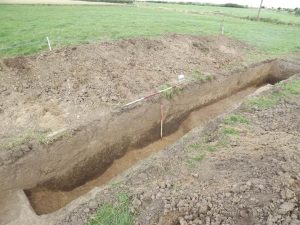In preparation for the start of onshore construction in September 2018, Triton Knoll carried out an extensive and detailed programme of archaeological surveys and evaluation of the project’s entire onshore Electrical System.
The work was undertaken in accordance with planning policy and the commitments in the Triton Knoll Electrical System (TKES) Development Consent Order, and included a programme of archaeological trial trenching evaluation. At the heart of the survey works were local specialists Lincoln firm Allen Archaeology Ltd, who carried out the surveys on behalf of Triton Knoll.

The trial trenching works were preceded by a series of desk based studies and field based non-intrusive surveys. These prior works were required to build a picture of the archaeological potential of the onshore cable route and included:
– A Desk Based Assessment (DBA) which detailed all known archaeological and heritage sites
– Geophysical survey of the whole Electrical System. The technique employed measures differences in the magnetic field which can be produced by buried archaeology.
Over 350 trenches were excavated along the route of the cable system and at the substation site over a five month period, with up to four archaeological teams active in the field at the same time.
Alongside the trial trenching, the following archaeological studies and surveys were also completed:
- A metal detecting survey of selected sites
- A topographical survey to record any visible archaeological earthworks
- A desk-based geoarchaeological study followed by a programme of hand augering to look at buried materials or deposits which may be of archaeological and environmental significance.
The results of the evaluation studies and surveys have identified several sites of interest, which are now the subject of further more detailed archaeological mitigation works being carried out as part of the construction project.
Findings included (click on each Heading for more information):
- Roman and medieval salt making sites
- Remains of Roman, Romano British and medieval settlement
- Various artefacts
So, what happens next?
The findings of the trial trenching and other evaluation work identified several areas of interest and have helped us to build a detailed picture of the historic landscape surrounding the project. The evaluation stage informed the preparation of detailed Archaeological Written Schemes of Investigation (WSI) which have been approved by East Lindsey District Council and Boston Borough Council, in consultation with their Heritage Advisors.
The WSIs build upon the mitigation requirements agreed during the Development Consent Order (DCO) process and incorporate the findings of the surveys and evaluation conducted, along with consultation with the local authorities Heritage Advisors.
The WSIs set out the requirements for further archaeological investigation, monitoring and recording during the main construction phase, which began in September 2018. Click here to find out more about the mitigation stage.
